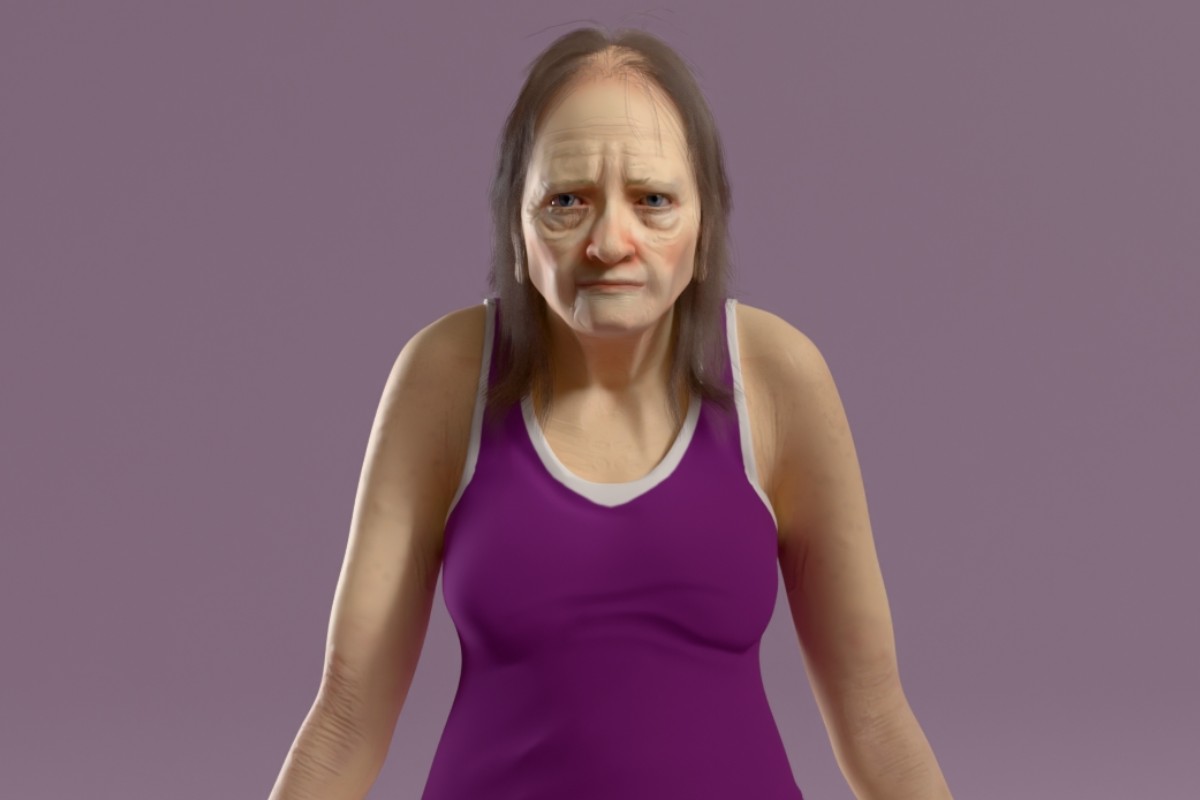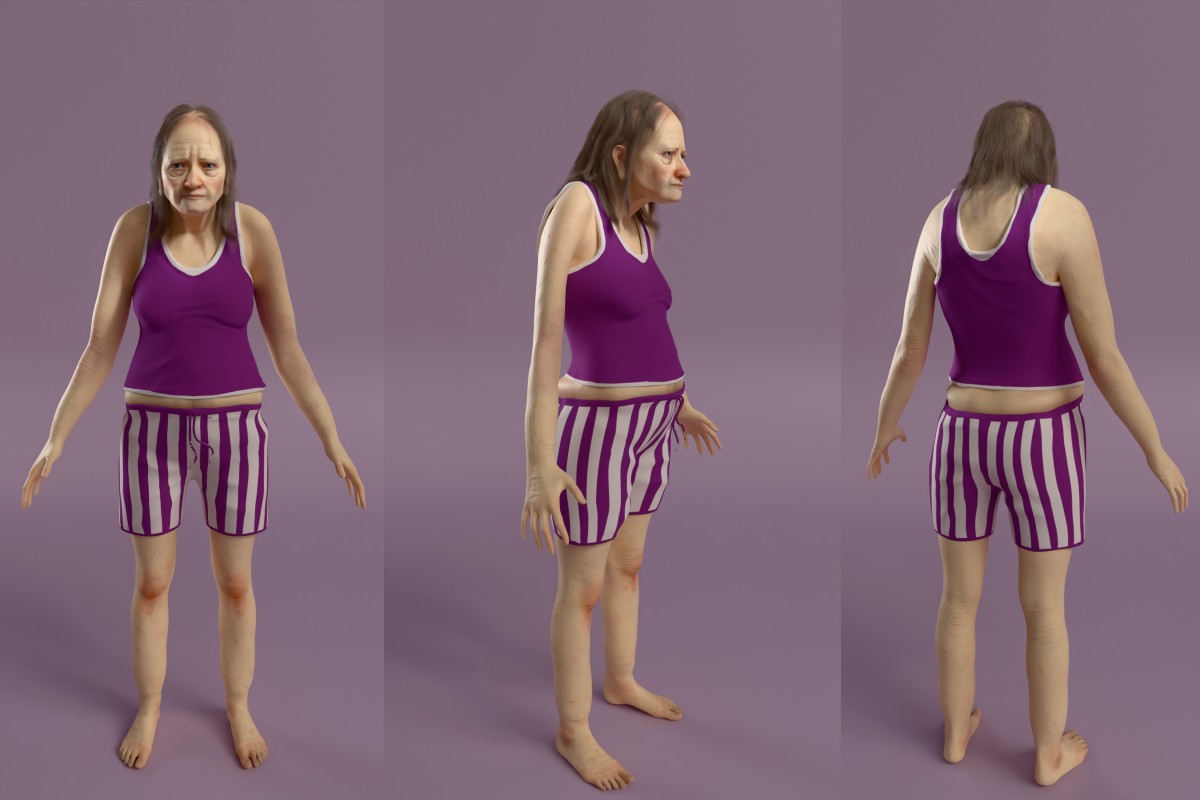
Does Lack of Sleep Age You?
Meet Hannah: A Life-Like Representation Of A Sleepless Brit In 2050
The UK is currently in a tiredness epidemic, and the average Brit gets just 6 hours and 24 minutes of sleep per night. What’s more, 71% of us don’t get the recommended 7 hours per night.
We know that sleep is vital to our overall health and wellbeing, not to mention that a cosy lie-in on a Sunday morning is one of life’s true pleasures. So what is this collective lack of sleep doing to us physically and mentally? What are the short- and long-term effects of poor sleep?
Well, to raise awareness about the importance of making time for quality sleep, we’ve asked our sleep expert Dr Sophie Bostock. She’s predicted what our bodies could look like in 25 years if we continue at the current rate. With that in mind, meet Hannah, a life-like visual representation of a sleepless Brit in 2050.

What has Poor Sleep Done to Hannah?
From short term memory loss and dramatic skin ageing to obesity and hair loss. Hannah is a dramatisation, informed by scientific, evidence-based research, on the physical impacts that a lack of sleep can have on the human body.
A chronic lack of sleep and an inability to ‘switch off’ has given Hannah her multiple skin problems including jaundice and wrinkles. What’s more her lifestyle and lack of a supportive mattress means her back is now permanently bent. Her sleep deprivation has also increased her sensitivity to pain and exacerbated spontaneous pain symptoms such as shoulder and back pain.
Dr Sophie Bostock says:
“Hannah is a thought-provoking illustration of the holistic impact that sleep has on maintaining overall health. Studies show that prolonged sleep deficiency can put you at a higher risk for conditions that may impact the heart including obesity, heart disease and type 2 diabetes.”
“Research into the importance of consistent, good quality sleep for our health and wellbeing has accelerated in the last few decades. Many of us don't realise that haphazard daily routines and lack of sleep interfere with our circadian rhythms, the 24-hour cycles which control our physiology,”.
The evidence for the design of Hannah was collated from published research papers in academic journals since 2010.* This included the physical impacts on the human body, including brain, immune system, muscles, skin, eyes and hair, that a lack of sleep can do to the body.
Let’s examine Hannah in more detail:
Head
Chronic poor sleep has meant that Hannah has developed alopecia. It has also negatively impacted both her short and long-term memory.*
Meanwhile, her eyelids are red, hanging and swollen. She has dark circles under her eyes, fine lines, and droopy corners around her mouth.
Late nights and early morning wakeup calls have weakened Hannah’s immune system. She seems more vulnerable to respiratory infections like the common cold and flu.*
Skin
Living consistently on only 6 hours of sleep has had a significant impact on Hannah’s skin, reducing elasticity and increasing signs of ageing.
Body
Sleeping on an old mattress is causing havoc on her skin; a haven for dust mites which has led to several skin conditions including eczema.
Hannah also lives in chronic pain. A lack of sleep has heightened her back pain which has been brought on by a poor mattress, which has not been supporting her body or spine properly. This relationship between sleep deficiency and pain is a vicious circle. It amplifies her sleep deficiency and makes the chronic pain in her shoulder and back worse.*
Her dog Brody also cuddles up next to her every night. While she might like the company, she has been awkwardly contorting her body in bed to make space for the pampered pooch.
Restricted sleep has affected both her leptin and ghrelin hormones, which control feelings of hunger and fullness. She now craves food all the time. Without enough sleep, her brain has reduced leptin and raised ghrelin, which is an appetite stimulant. The flux of these hormones could explain her nighttime snacking or why she overeats later in the night.
A lack of sleep has also made her feel too tired and unmotivated to exercise. Over time, Hannah has stopped working out which has made her gain significant weight around her tummy.
Finally, living on empty day in and day out has caused Hannah to get muscle atrophy with her arms and legs shrinking in size and shape. Prolonged sleep deficiency has given Hannah heart disease, prematurely affecting her life expectancy, one of the signs of which is her swollen ankles*.
How to Avoid The Pitfalls of Poor Sleep
Hannah is a worst-case scenario prediction of what could happen to somebody if they do everything badly in terms of poor sleep routine and poor mattress support. We created this model to make people think more carefully about their overall sleep experience. Using this visual makes it easier for people to identify with the issue and the key signs.
Of course, she doesn’t represent all Brits, but at Benson's, we believe passionately in the power of proper sleep. But how do you avoid turning into Hannah?
Along with Dr Bostock, we’ve proposed several sleep hygiene strategies for Brits to take better care of themselves such as meditation, staying hydrated and investing in a supportive mattress.
- Get out of bed at the same time every day, including at weekends, as much as you can. This will help to keep your circadian rhythm in sync, allowing you to drift off and wake up much easier.
- Be physically active. The government recommends 150 minutes of moderate or 75 minutes of vigorous physical activity per week, plus 2 strength-building sessions, and 2 balance sessions for good health.Physical exercise also brings a raft of mental health benefits, and poor mental health can be detrimental to your sleep.
- Seek out natural light during daylight hours. Take breaks outside whenever possible, and work by a window if you can. Two hours before bed, turn down bright overhead lights and keep your bedroom as dark as possible. Also try to keep your bedroom a cool, comfortable temperature and block out as much noise as you can.
- Finish your main meal at least two hours before you get ready for bed. Eating late can disrupt the quality of your sleep. Alcohol and smoking can be particularly detrimental to the quality and duration of your sleep.
- Protect the last 30 minutes of the day to wind down and switch off. Keep your phone and screens outside the bedroom. Use your bed for sleep and intimacy, and nothing else.
- Invest in a comfortable, supportive mattress. Mattresses need replacing every 8-10 years otherwise they can become less supportive and not a nice, clean place to sleep.
What can I do if I’m worried about my sleep?
If you are struggling with insomnia, you can find advice from Dr Sophie Bostock in the Bensons for Beds Sleep Hub.
However, the recommended treatment for insomnia, if all else fails, is to speak to a medical professional for advice. Your GP may be able to give you advice about healthy sleep habits, or rule out other conditions which could be affecting your sleep.
They may also be able to refer you to a talking therapy approach called Cognitive Behavioural Therapy for Insomnia (CBT for Insomnia). This can help you identify the thoughts, feelings and behaviours that might contribute to insomnia, and replace them with habits that support good sleep. Rather than medication which can alleviate the symptoms, CBT for Insomnia helps address the cause for a longer-term, sustainable solution.
Sleep is an incredibly important aspect of our lives, but one we can easily overlook, sometimes through no fault of our own. If you’re looking for a new bed, mattress or bedroom furniture, we stock a wide range to suit all styles and budgets.
Sources

Gemma Henry - Content Lead
Gemma finds sleep fascinating and describes the discovery aspect of her role as eye-opening. Her keen eye for detail and dedication to thorough research ensures that Bensons customers get the informative sleep-based advice they're looking for.